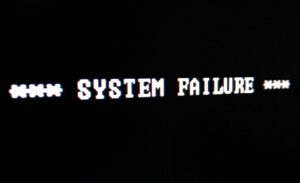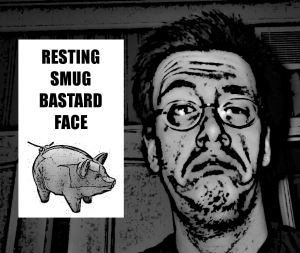“You’re the Worst” & Subtle Unreliability

It’s Not Funny
Used to be, things like unreliable narrators or breaking the Fourth Wall on television was a bold and uncanny thing to do. It shocked viewers who had been trained to rely on the narratives and narrators TV offered up. But as TV shows have gotten more and more novelistic in their approach, the Fourth Wall is getting demolished. And unreliable narration is almost assumed.
Novels, after all, don’t have a Fourth Wall. When you read a book the narrator’s voice is in your head, addressing you. You’re basically there, following everyone around. So when a TV show like Mr. Robot or Fleabag deletes the Fourth Wall, it edges closer to being a novel in visual form. When those narrators prove to be unreliable, it can still pack a punch, but often it’s easy to see. Who, after all, was at all surprised when Fleabag or Elliot turned out to be unreliable? No one who was paying attention. It still worked, it just wasn’t a surprise. Which is neither a good thing or a bad thing.
Another show that transcends typical TV comedy work is You’re the Worst, which could be a dumb show about trying to disgust the audience as much as possible with how truly terrible the characters are, but is just smart enough to back up off that level of depravity. The characters on You’re the Worst are in fact terrible people, but there’s just enough decency sprinkled in to keep your attention.
It’s also a show playing with unreliableness, which might come as a surprise, as it isn’t a show with a fixed POV or narrator, and always seems to be presenting these awful people more or less as they are. But the show has been revealed to be subtly unreliable because of S03EP05, “Twenty Two.”
Shitty Jimmy & Company
So, You’re the Worst, like most TV comedies, has a core cast who play specific roles. The main characters are Jimmy and Gretchen, two awful assholes living and striving in L.A. In their orbit are some friends: Shallow, monstrous Lindsey, her milquetoasty husband Paul, and Jimmy’s odd roommate Edgar. Other characters orbit at increasing distances from these. This is a pretty standard comedy setup: Main folks, second-tier characters, and a diaspora of decreasingly important characters.
What’s interesting about comedies is that there are funny folks and straight people. Straight people are often used to bring context—and in the case of You’re the Worst, the straight person is usually Edgar. Edgar has PTSD after his service in Iraq, and lives with Jimmy in exchange for acting as a cook, housekeeper, and general servant. In the past he regards Jimmy as his friend, but he is always somewhat disturbed by the callous and terrible nature of the people around him. His character serves as an important contrast, because he’s fundamentally decent, always means well, and registers his hurt when Jimmy and the others treat him awfully, which they always do. Without Edgar the show would be 100% assholes, and as anyone can tell you, a show that’s 100% assholes is Seinfeld, or Veep, and that only happens once a century or so.
So, Edgar’s usually not the funniest person on the show. He reacts, and sometimes he’s in funny situations, but he’s not actually all that funny. In fact, the show puts a button on this by having Edgar become involved with Improv Comedy, and be more or less terrible at it. He’s not funny, because he’s not the main character of the show.
Which becomes very interesting in “Twenty Two,” which is the first episode of the series from Edgar’s point of view. And it’s not really a funny episode. It barely has any jokes. Because suddenly we’re seeing it fro Edgar’s point of view, and the people around him aren’t hilariously callous—they aren’t hilarious at all. They’re just terrible people.
What If You’re Just a Character in My Sitcom?
This is interesting because it forcibly reminds the audience that in the previous episodes of the series, they’ve been seeing everything from the main characters’ POV. From Jimmy and Gretchen and Lindsey’s POV, everything is hilarious, because they’re the center of the show. Their POV dominates everything. Yes, they can sometimes see the pain and suffering of others, but it’s marginalized, distant, and easily ignored.
The audience of course always identifies with the main characters; we can’t help it. Even the Walter Whites of the world, we want them to succeed. To survive. It’s human nature.
So “Twenty Two” shifts away and offers us Edgar’s POV, and suddenly the people we’ve been laughing at and with, the people who we unconsciously regard as the protagonists of this story, are revealed to be braying, not-particularly-funny assholes. And Poor Edgar, rather than being a supporting player in a comedy, is the lead actor in a tragedy, and we’ve been watching him for dozens of episodes without a thought, and that makes us complicit assholes as well.
It’s a sobering, exciting moment. While Fleabag‘s cheeky glances and funny asides and Mr. Robot‘s paranoid lectures might be flashier and more obvious breakings of the Fourth Wall and reliability, You’re the Worst‘s is more powerful, because even as you watch it some time goes by before you realize you’ve just seen a complete shift not just of POV but of tone, inviting you to realize that your impression of the show has been carefully managed all along, and you’re part of it.
You’re always part of it.











 In 2002, a year in which otherwise almost nothing I can remember happened, the New York Times reported that “a recent survey” confirmed the worst fears of many Americans:
In 2002, a year in which otherwise almost nothing I can remember happened, the New York Times reported that “a recent survey” confirmed the worst fears of many Americans: 